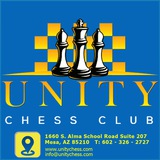Careful! After 59...c2?, White manages to create threats against the black king: 60.Rf7+ Kh8 61.Rf6=. Black could also win with 59...d1=Q 60.Rxd1 c2–+.
White resigned, since after 61.Rxd1 c2, Black makes a queen with tempo. Incidentally, Black avoided a cunning trap: after 60...c2 61.R6g5, Black cannot avoid move repetition.
Unity Chess Club
Lev Psakhis Alexei Vyzmanavin Moscow 1981 White to move
It is obvious that in the current pawn battle, White has the better chances. However, after an exchange of one pair of pawns on the queenside and the appearance there of the black knight, the win would be problematical. White’s solution is elegant and convincing:
The pawn on b6 is defended, the Rb7 passive, and the only other blockader of the white pawns is eliminated on g4. There is no way to stop the white pawns, so Black resigned.
Unity Chess Club
Jeroen Piket John Nunn Wijk aan Zee 1990 Black to move
The motif of advancing the pawns closer to queen strikes one at first glance. And certainly, with his knight so far away, the white queen has trouble coping with the excellently-coordinated black pieces, supporting their passed pawn.
Now, the black bishop can support the passed pawn from f1 rather than h3, which facilitates the bringing up of additional help in the form of the h-pawn.
It was essential to play 34.Qg1! Bh3 (34...Nd4 35.Qxg2+ Kf7 36.f3 h5 leads to something close to a positional draw –
It was essential to play 34.Qg1! Bh3 (34...Nd4 35.Qxg2+ Kf7 36.f3 h5 leads to something close to a positional draw –
34...Bxb5 35.Qg1 Bf1 36.Qh2 Bxh4 37.Qxh4 g1=Q 38.Qd8+ Kg7 39.Qxc7+ Kh6 40.Qxb6+ Kh5 41.b4 Bd3+ 42.Kd2 Qxf2+
Unity Chess Club
Marat Makarov 2523 Konstantin Sakaev 2649 Russia 2002 Black to move
The white e-pawn cannot advance, because the d4-pawn would be hanging. This means that it needs to be blockaded, so as to leave White with a bad bishop. Obviously, to do this, we need the knight. The route to e4 is obvious:
The attack on the rook is extremely useful for Black, as it effectively shortens by one tempo the route to e4.
Definitely the right move, forcing the exchange of bishops. The superiority of the knight over the remaining white bishop will be overwhelming.
